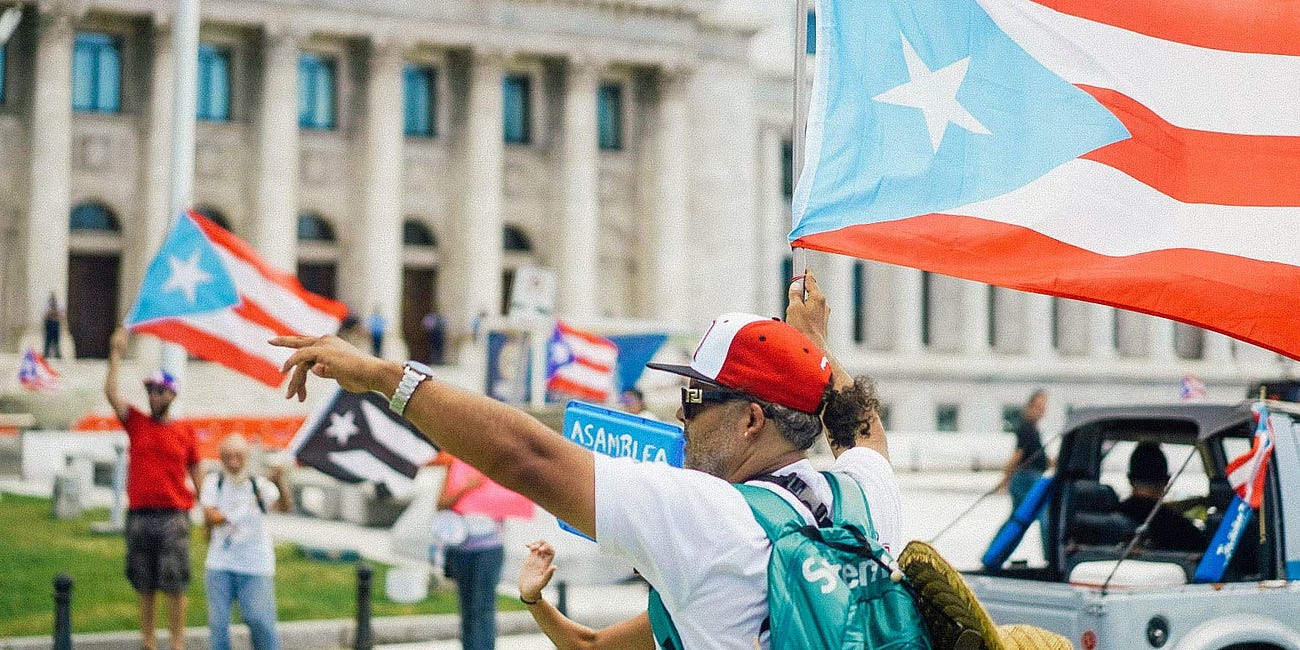A Nationalist Policy Priority
On March 7th the British Daily Mail reported in an exclusive [Trump pressured to make Puerto Rico independent to save America $617 billion]that members of Congress and Puerto Rican nationalists had worked together to publish a memo in the form of a draft executive order. This hypothetical executive order would begin the process of decolonizing Puerto Rico and ultimately end its proposed 21-month timeline with Puerto Rico gaining full and complete sovereignty from the United States. According to the Daily Mail this memo is in the possession of Secretary of State Marco Rubio, DNI Tulsi Gabbard, certain members of Congress, and Susi Wiles, Trump’s White House Chief of Staff. The Mail also reports that congressional staffers have held meetings on the issue.
While no definitive action has been taken these are fantastic developments for patriotic and nationally oriented Americans looking to put the interests of our country first. Puerto Rico is not nor has ever been an integral part of the American nation—indeed, Puerto Rico is its own nation with a unique identity, faith, language, and customs that it should be proud of. Because of these disparate identities White Papers has long advocated for Puerto Rico and the United States to dissolve the current colonial-era relationship and for Puerto Rico to becoming an independent nation-state.
Now that separation between the United States and Puerto Rico is being discussed in the halls of government it is time to update and mature our policy proposals for cutting ties with Puerto Rico. I am going to examine and critique the draft memo/executive order on Puerto Rican independence and propose America First policy alternatives as I do so. The seven page document (which you can read here) contains dozens of provisions in several sections, rather than going over the entire memo I am going to focus on those provisions that are decidedly not in the interests of the American people and make recommendations on how to change and improve them so they are mutually beneficial to both Americans and Puerto Ricans.
The first glaring issue appears in Section 4. Financial Provisions in part B, part B reads:
“(b) The Puerto Rico Transition Fund: This Executive Order proposes a one-time, 20-year support package to a Puerto Rico Transition Fund to facilitate Puerto Rico’s successful transition to independence, replacing the projected $1.37 trillion in federal spending over 50 years with a $720 fund ($36 billion annually). This plan results in $617.8 billion in savings for the U.S. while providing Puerto Rico with the necessary resources to economic self-sufficiency.”
There are a few patently ridiculous aspects to this policy. First is the idea that a 20-year support package is in any way a “one-time” deal. This would in fact be a generation spanning package. There is also the fact that $36 billion in annual funding is more than 42 of the 50 states received from the federal government in fiscal year 2022, the American people want to stop funding foreign nations above and beyond what our government provides us at home and adding Puerto Rico to the foreign aid roster in this manner is simply unacceptable. There is also the matter than this funding would not result in “economic self-sufficiency” for Puerto Rico but would very likely create, or perpetuate, the island’s current dependence on the American taxpayer. Prior to 2020 annual federal transfers to Puerto Rico totaled some $20 billion while post-2020 the average has doubled to roughly $40 billion annually, just about half of this money is in the form of Social Security and Medicare/Medicaid.
Rather than spending $36 billion each year for two decades in what amounts to one nation subsidizing the other the United States should set Puerto Rico up for success. We recommend the following policies to set Puerto Rico up for success:
I. The United States will pay off Puerto Rico’s remaining debt. Post-restructuring Puerto Rico’s debt was reduced from upwards of $73 billion to $30 billion today (a 58% reduction). The American people do not want another debt-ridden failed state in the region and so it is in the best interest of both nations to put Puerto Rico in a sustainable fiscal position by having the US pay off the remainder of Puerto Rico’s debt during the transition to independence.
II. The United States will endow a Puerto Rico Sovereign Wealth Fund (PRSWF) with $150 billion. If managed correctly, such as the Norwegian sovereign wealth fund, the Puerto Rican state could reasonably expect an annual return income of $9.5 billion to $11.5 billion from the PRSWF. This amounts to one-third of the island’s 2024 budget of $33.3 billion.
III. The United States will fund the $8 billion construction of 2 gigawatt-hour nuclear reactors to provide Puerto Rico with 16 billion kilowatt-hours of electricity annually. Currently Puerto Rico spends upwards of $4 billion per year importing fossil fuels to generate its needed 20 billion kilowatt-hours of electricity. These nuclear facilities will provide Puerto Rico with 80% of its current electricity needs and radically reduce its import costs.
IV. The United States will transfer $16 billion per year for 10 years to sustain Puerto Rican access to Social Security and Medicaid/Medicaid during the transition to new Puerto Rican public assistance programs. Immediately upon the beginning of the transition process Puerto Rico will begin to collect the roughly $4 billion in federal taxation its residents pay, overwhelmingly in the form of FICA taxes. The United States $16 billion in assistance will cover the remainder of FICA-related spending while Puerto Rico establishes its welfare state.
V. The United States will issue $10 billion in grants to organizations and agencies working to return Puerto Ricans to the island. Luring the diaspora home has long been a priority for Puerto Rico’s government, its pro-statehood parties and its pro-independence parties. The exodus of Puerto Ricans has resulted in the territory having the second highest median age in the United States, this does not bode well for the future of the Puerto Rican nation. As such groups and organizations dedicated to bringing the young diaspora back to Puerto Rico will receive grants to bring these policies into reality.
Part V of the suggested policies is linked directly to the second major issue with the proposed memo. Section 6. Citizenship parts B, F and G read:
“(b) All citizens of the United States by their birth in Puerto Rico as of December 31, 2026, shall retain their U.S. citizenship, responsibilities, and privileges about said citizenship.”
“(f) Puerto Rican and U.S. Citizens shall have the right to free transit between Puerto Rico and the United States without restrictions.”
“(g) Reciprocal Rights of Residence, Employment, and Property Ownership: The United States and the Republic of Puerto Rico shall establish a bilateral agreement ensuring reciprocal rights of entry, residence, employment, education, and property ownership for their respective citizens. Nationals of both states shall be permitted to reside, work, study, and acquire property in either jurisdiction without undue restrictions, subject to applicable laws and regulations governing immigration, labor, and property rights.”
All three of these provisions make little sense for two distinct nations seeking to separate. Stateside Puerto Ricans with little substantive connection to the United States should not be permitted to retain their United States citizenship. There is a case for allowing the 25% of stateside Puerto Ricans married to historic (White, Black, etc.) Americans to remain in the country—a population of about 425,000 people. There are also third-generation stateside Puerto Ricans less than a quarter of whom speak Spanish or identify as Hispanic/Puerto Rican. These 1.624 million primarily American-identifying individuals should be among those permitted to stay.
This still leaves 4 million stateside Puerto Ricans. The United States should take the following actions:
I. Convert the citizenship of stateside Puerto Ricans who lack an American spouse or third-generation status into permanent residents (Green Card holders).
II. Puerto Rican Green Card holders with a criminal record will have their status revoked and will be deported to Puerto Rico without delay. About 5% of the stateside Puerto Rican population have had ‘contact’ with the criminal justice system, representing about 200,000 of the future Puerto Rican Green Card holders.
III. Puerto Ricans who have failed to integrate will be given support to return home. In keeping with the president’s executive order that English is the official language of the United States it must be policy, starting on the day the independence process begins, that stateside Puerto Ricans who do not speak English—that is, those who have clearly failed to integrate—must relocate to Puerto Rico within 5 years. Roughly 825,000 stateside Puerto Ricans have failed to learn English, with the vast share being people born in Puerto Rico who relocated to the United States.
IV. Puerto Ricans dependent upon public assistance will be deported. Roughly half of stateside Puerto Ricans who would be Green Card holders, or about 2 million people in our scenario, are dependent upon the American welfare state to survive—this includes figures as staggeringly high as 60% of Puerto Ricans in New York City. These Puerto Ricans must be deprived of their permanent residency as they are the very definition of a public charge in any commonsense framing of the issue. They will be deported to Puerto Rico over the course of the 12-year program envisioned in the American Repatriation Policy Platform (ARPP).
There are also the issues of free movement mentioned in parts F and G of Section 6 on citizenship. Mass immigration continues to be the greatest issue facing the American nation and for this reason it should not be permitted—let alone facilitated—for any reason. There may be a case to make for allowing Puerto Rican students to attend American universities, and for treaties simplifying cross border tourism and travel for work (but not settlement) related reasons. What is not reasonable is any legal framework where the American people are required to keep our borders open to a foreign nation.
The separation between Puerto Rico and the United States can certainly be amicable, but the proposal contained in the draft memo requires significant alteration in order to benefit the American people as much as it is clearly designed to benefit Puerto Rican national interests.


